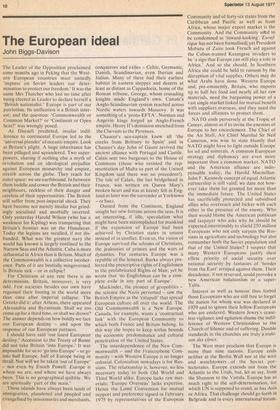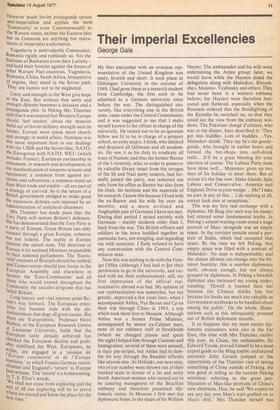The European ideal
John Biggs-Davison
The Leader of the Opposition proclaimed some months ago in Peking that the Western European countries must unitedly 'impress on Soviet leaders our determination to protect our freedom.' It was the same Mrs Thatcher who lost no time after being elected as Leader to declare herself a `British nationalist.' Europe is part of our patriotism. Its unification is a British interest; and the question: ,`Commonwealth or Common Market?' or `Continent or Open Seas?' was wrongly posed.
As Disraeli predicted, insular indifference to continental Europe led to the 'universal plunder' of oceanic empire. Look at Britain's plight. A huge inheritance has been pillaged and squandered. Two superpowers, sharing if nothing else a myth of • revolution and an ideological prejudice against European monarchy and empire, stretch across the globe. They reach for outer space: we are earthbound. In between them huddle and cower the British and their neighbours, reckless of their danger and careless of their opportunities. The British still suffer from, post-imperial shock. They have become not merely insular but grindingly socialised and morbidly inverted. Only yesterday Harold Wilson (who has a weakness for Kipling) was trumpeting that Britain's frontier was on the Himalayas. Today the legions are recalled, if not disbanded. What was the greatest navy the world has known is largely confined to the Narrow Seas and the Atlantic. Cuba is more influential in Africa than is Britain. Much of the Commonwealth is a collective incoherence. Parts of it are bestially misgoverned. Is Britain sick — or in eclipse?
For Christians at any rate there is no determinism. Britain, moreover, is very odd. Few societies besides our own have regained their footing in the world more than once after imperial collapse. The Greeks did it: after Athens, there appeared Alexandria and Byzantium. Shall we too come up for a third time, or shall we drown? The answer depends on how boldly we face our European destiny — and upon the response of our European partners.
I should have said `our latest European destiny.' Accession to the Treaty of Rome did not take Britain 'into Europe.' It was impossible for us to `go into Europe' —or go into .half Europe, half of Europe being in thrall. Nor will we be taken `out of Europe' — not even by Enoch Powell. Europe is where we are, and where we have always been. This is no geographical quibble. We are spiritually 'part of the main.'
These islands have always been lands of immigration, plundered and peopled and evangelised by missionaries and merchants, conquerors and exiles — Celtic, Germanic, Danish, Scandinavian, even Iberian and Italian. Many of these had their earliest habitat in eastern steppes and deserts at least as distant as Cappadocia, home of the Roman tribune, George, whom crusading knights made England's own. Canute's Anglo-Scandinavian system reached across Nordic waters towards Muscovy. It was something of a `proto-EFTA'. Norman and Angevin kings forged an Anglo-French empire. Henry ll's dominion stretched from the Cheviots to the Pyrenees.
Chaucer's sea-captain knew all 'the creeks from Brittany to Spain' and in Chaucer's day John of Gaunt revived the ancient alliance with Portugal and Castile. Calais sent two burgesses to the House of Commons (those who resisted the representation of Malta. as part of the United Kingdom said there was no precedent!). The tale of Calais, the last bridgehead in France, was written on , Queen Mary's broken heart and was as keenly felt in England as later was the surrender at Yorktown —or Suez.
Ousted from the Continent, England sought her new fortune across the seas. It is an interesting, if idle, speculation what might have been accomplished for mankind if the expansion of Europe had been achieved by Christian states in unison instead of in conflict. Even so, the vision of Europe survived the schisms of Christians, the jealousies of princes and the wars of dynasties. For centuries Europe was a republic of the lettered. Burke always preferred the prescriptive rights of Englishmen to the prefabricated Rights of Man; yet he wrote that 'no Englishman can be a complete exile in any part of Europe'.
Mackinder, the pioneer of geopolitics — the science the Nazis perverted — saw the British Empire as the `catapult' that spread European culture all over the world. The Old Commonwealth is a New Europe. Canada, for example, wants a 'contractual link' with the European Community to which both France and Britain belong. In this way she hopes to keep within bounds the economic predominance and cultural penetration of the United States.
The interdependence of the New Commonwealth — and the Francophone Community — with Western Europe is no longer colonial. Colonialism nowadays is for Russians. The relationship is, however, no less necessary today to both Old World and Third World alike. Europe lacks raw materials; 'Europe Overseas' lacks expertise. Hence the Lome Convention for mutual support and preference signed in February 1975 by representatives of the European
Community and of forty-six states from the Caribbean and Pacific as well as from Africa, whose major export market is the Community. And the Community ustd to be condemned as 'inward-looking'. Eurafrique has not been formalised; yet President Mobutu Of Zaire took French aid against the Cuban-trained Katangese invaders to be `a sign that Europe can still playa role in Africa.' And so she should. In Southern Africa she could be held to ransom by the disruption of vital supplies. Others may do what Arabs have done. Western Europe and, pre-eminently, Britain, who imports Up to half her food and nearly all her raw materials, need the bargaining power of a vast single market linked for mutual benefit with suppliers overseas, and they need the forces and alliances to protect them.
NATO ends perversely at the Tropic of Cancer, almost as if to invite the enemies of Europe to her encirclement. The Chief of the Air Staff, Air Chief Marshal Sir Neil Cameron, was wise to state bluntly that NATO might have to fight outside Europe' for oil and minerals. A common European strategy and diplomacy are even more important than a common market. NATO and the American alliance' are indispensable today; the Harold MacmillanJohn F. Kennedy concept of equal Atlantic partnership is still valid; we dare not however take them for granted for more than the immediate future. The United States has sacrificially protected and subsidised allies who overreach and bicker with each other in the presence of the enemy. Who then would blame the American politician and taxpayer who asks why be should be 'expected interminably to shield 250 million Europeans who not only surpass the Russians in agriculture and technology but also outnumber both the Soviet population and that of the United States? I suspect that many Western Europeans justify their effete priority of social security over national security by -fantasies of 'hordes from the East' arrayed against them. Their decadence, if not reversed, could provoke a new American isolationism or a. superYalta.
Interest as well as honour thus forbid those Europeans who are still free to forget the nation for whom war was declared in 1939 and to ignore their fellow-Europeans who are enslaved. Western Jewry's ceaseless vigilance and agitation shame the indifference of Western Christendom to the Church of Silence and of suffering. Double standards in the churches are truly a traldson des clercs.
'The West must proclaim that Europe is more than nine nations. Europe ends neither at the Berlin Wall nor at the wire and watchtowers ,of the Soviet . por, tectorates. Europe extends not from the Atlantic to the Urals, but, let us say, from the Shannon to the Vistula. Europe has as much right to the self-determination, for which UN is supposed to stand, as has Asia . or Africa. That challenge should go forth in Belgrade and in every international forum.
However much Soviet propaganda spouts anti-imperialism and applies the term 'Community' or even 'Commonwealth' to the Warsaw states, neither the Eastern bloc nor its Comecon are anything but instruments of imperialist exploitation.
Yugoslavia is ambivalently Communist; Romania rigidly and ruthlessly so. Yet the Stalinists of Bucharest avow their Latinity — and hold their frontier against the forces of Other Warsaw Pact countries. Yugoslavia, Romania, China, South Africa., Irrespective of regime, they stand in the Soviet path. They are factors not to be neglected.
Unity and strength in the West give hope to the East. But without that unity and strength détente becomes a delusion and a Propaganda plot. In Peking Mrs Thatcher said that it was natural that Western Europe Should 'feel anxiety' about the 'massive build-up' of Soviet military strength near its border. Europe must speak more clearly and strongly in world affairs. Nowhere was this more important than in our dealings With the USSR and the Soviet bloc. NATO: the Eurogroup with NATO; WEU (which includes France); European partnership in armament, in research and development, in the standardisation of weapons systems and equipment; a common front against terrorism and subversion; a common stand on East-West trade and credits — all are part of
strategy of survival. So is the return of a British government pledged to make good the successive defence cuts imposed by an Administration of unilateral disarmers.
Mrs Thatcher has made plain that the Tory Party will restore Britain's defences. She has demonstrated that the Tory Party is
Party of Europe. Great Britain can only succeed through a great Europe, cohesive but not federal. The reality in Europe remains the nation state. The direction of Europe is for national Ministers responsible to their national parliaments. The 'Eurocratic' excesses of Brussels should be curbed; and Conservatives should join forces in the European Assembly and elsewhere to counter the 'Euro-Communists' and all those who would extend throughout the Community the socialist dirigisme that has tailed Britain.
• Long history and vital interest point Britain's way forward. The European enterprise has become stale with the disenchantment that dogs all great causes. But there are 'Europtimists.' Professor Henri Rieben, of the European Research Centre at Lausanne University, holds that the European unity already achieved has checked the European decline and probablY stabilised the West. Europeans, he writes, are engaged in a 'reunion de Europe continental et de l'Europe Inaritime,' to whicli Franco-German reconciliation and England's 'return' to Europe bear witness. This 'return' is a homecoming. In T. S. Eliot's words,
e shall not cease from exploring and the end of all our exploring will be to arrive where we started and know the place for the first time.'



































 Previous page
Previous page